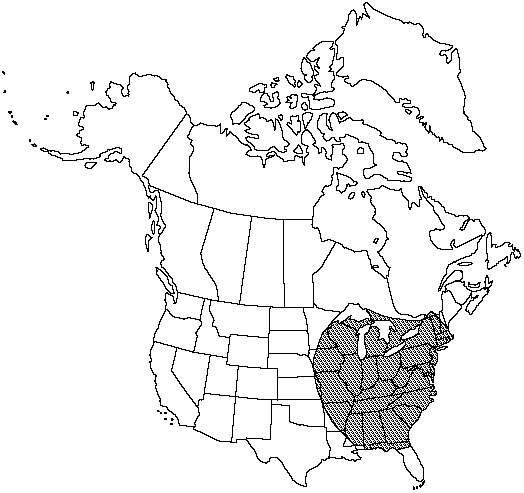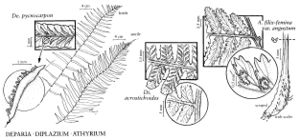Difference between revisions of "Diplazium pycnocarpon"
Index N. Amer. Ferns 60. 1938.
FNA>Volume Importer |
imported>Volume Importer |
||
| (3 intermediate revisions by 2 users not shown) | |||
| Line 8: | Line 8: | ||
}} | }} | ||
|common_names=Narrow-leaved glade fern;narrow-leaved-spleenwort;glade fern;diplazie à sores denses | |common_names=Narrow-leaved glade fern;narrow-leaved-spleenwort;glade fern;diplazie à sores denses | ||
| + | |special_status={{Treatment/ID/Special_status | ||
| + | |code=F | ||
| + | |label=Illustrated | ||
| + | }}{{Treatment/ID/Special_status | ||
| + | |code=E | ||
| + | |label=Endemic | ||
| + | }} | ||
|basionyms={{Treatment/ID/Basionym | |basionyms={{Treatment/ID/Basionym | ||
|name=Asplenium pycnocarpon | |name=Asplenium pycnocarpon | ||
|authority=Sprengel | |authority=Sprengel | ||
| + | |rank=species | ||
|publication_title=Anleit. Kenntn. Gew. | |publication_title=Anleit. Kenntn. Gew. | ||
|publication_place=3: 112. 1804 | |publication_place=3: 112. 1804 | ||
| Line 17: | Line 25: | ||
|name=Athyrium pycnocarpon | |name=Athyrium pycnocarpon | ||
|authority=(Sprengel) Tidestrom | |authority=(Sprengel) Tidestrom | ||
| + | |rank=species | ||
}} {{Treatment/ID/Synonym | }} {{Treatment/ID/Synonym | ||
|name=Homalosorus pycnocarpos | |name=Homalosorus pycnocarpos | ||
|authority=(Sprengel) Pichi-Sermolli | |authority=(Sprengel) Pichi-Sermolli | ||
| + | |rank=species | ||
}} | }} | ||
|hierarchy=Dryopteridaceae;Diplazium;Diplazium pycnocarpon | |hierarchy=Dryopteridaceae;Diplazium;Diplazium pycnocarpon | ||
| Line 43: | Line 53: | ||
-->{{#Taxon: | -->{{#Taxon: | ||
name=Diplazium pycnocarpon | name=Diplazium pycnocarpon | ||
| − | |||
|authority=(Sprengel) M. Broun | |authority=(Sprengel) M. Broun | ||
|rank=species | |rank=species | ||
| Line 56: | Line 65: | ||
|publication title=Index N. Amer. Ferns | |publication title=Index N. Amer. Ferns | ||
|publication year=1938 | |publication year=1938 | ||
| − | |special status= | + | |special status=Illustrated;Endemic |
| − | |source xml=https:// | + | |source xml=https://bitbucket.org/aafc-mbb/fna-data-curation/src/2e0870ddd59836b60bcf96646a41e87ea5a5943a/coarse_grained_fna_xml/V2/V2_503.xml |
|genus=Diplazium | |genus=Diplazium | ||
|species=Diplazium pycnocarpon | |species=Diplazium pycnocarpon | ||
Latest revision as of 20:23, 5 November 2020
Stems creeping; scales brown, broadly lanceolate, margins entire. Petiole 15–40(–50) cm. Blade oblong-lanceolate, 1-pinnate, 30–75 × 8–25 cm, ± narrowed to base with reduced proximal pinnae, broadest above base, abruptly acuminate to apex. Pinnae linear, ± entire to shallowly crenulate, base truncate or acroscopically auriculate, apex acuminate. Veins usually 1–2-forked, nearly reaching sinuses between crenations. Sori elongate, straight or slightly falcate, single or rarely double; indusia vaulted, ± thick. 2n = 80.
Habitat: Moist woods and slopes in neutral soil
Elevation: 150–1000 m
Distribution

Ont., Que., Ala., Ark., Conn., Del., D.C., Fla., Ga., Ill., Ind., Iowa, Kans., Ky., La., Md., Mass., Mich., Minn., Miss., Mo., N.H., N.J., N.Y., N.C., Ohio, Pa., R.I., S.C., Tenn., Vt., Va., W.Va., Wis.
Discussion
Diplazium pycnocarpon has commonly been placed in Athyrium, but it is closely related to the east Malesian Diplazium flavoviride Alston (M. Kato and D. Darnaedi 1988).
Selected References
None.
